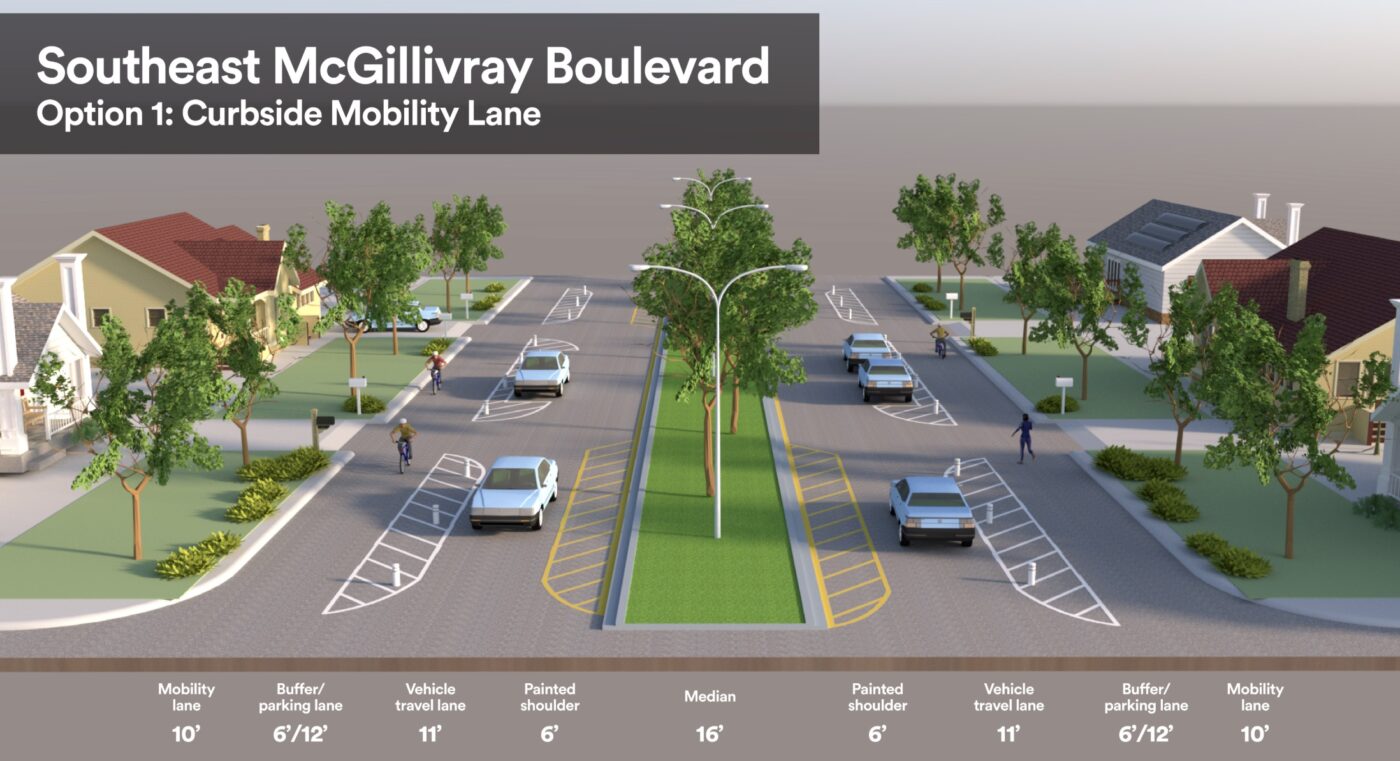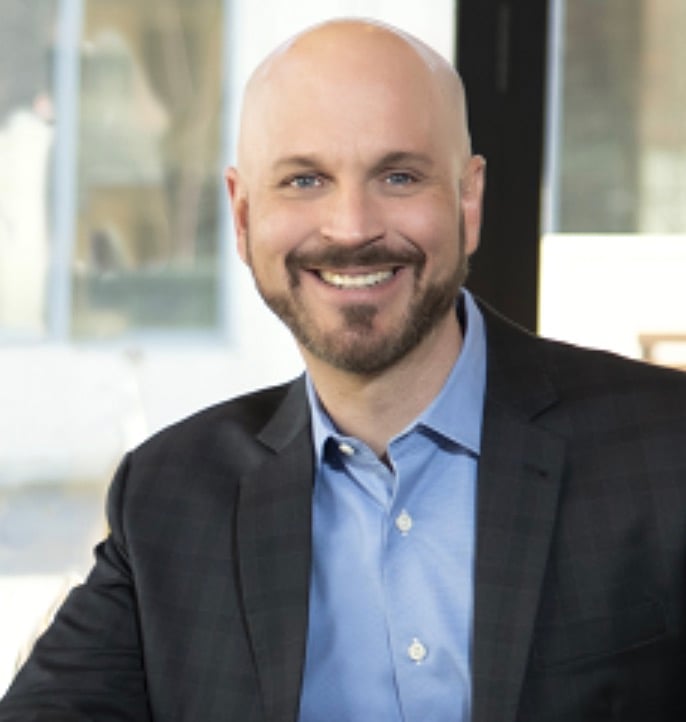Transportation politics in Vancouver, Washington bought just a little extra attention-grabbing earlier this month when a bunch of grassroots activists turned in sufficient signatures to maneuver their “Save our Streets” petition ahead. Volunteers gathered 6,572 signatures (2,300 greater than they wanted) to assist their purpose to amend Vancouver Municipal Code to state that an election of the individuals should happen earlier than town can transfer ahead on any mission that reduces driving lanes and converts them to different makes use of.
“If handed, any adjustments to site visitors lanes that end result within the lack of a lane for car journey must be authorised by a majority of voters in Vancouver,” experiences The Columbian.
The signatures are an enormous victory for “Save Our Streets,” the group behind the petition, however they haven’t achieved their purpose simply but. In an interview with BikePortland immediately, Vancouver Metropolis Council Member Ty Stober defined how the initiative should nonetheless be validated by town clerk. Whether or not it finally passes or not, Stober stated the whole episode illustrates how troublesome it may be to just accept change.

Save our Streets has pushed again on the Metropolis of Vancouver’s Full Streets Program, which incorporates main highway redesign tasks that look to enhance security and add protected “mobility lanes” (how Vancouver well refers to bike lanes), scale back speeds, and enhance security. One topic of the group’s ire is a mission on SE McGillivray Boulevard set to start subsequent yr. The popular design (above) would change the road from its present profile of six lanes for automobile customers (4 for driving, two for parking) and one slender, unprotected bike lane; to 2 lanes for drivers, fewer parking areas, and a 10-foot extensive mobility lane buffered from site visitors by a parking lane buffer.
That extra trendy, safer design is what “Save Our Streets” and their supporters need to save Vancouverites from.
One of many chief petitioners, Laurie Arndt, who’s lived a number of blocks off McGillivray for 46 years, instructed me immediately she’s fearful that town’s design will result in extra harmful driving. Not much less. She says having just one lane for drivers isn’t sufficient. “Persons are very pissed off once they can’t go quick and it’s simply going to trigger numerous congestion and frustration, and other people will veer out of the areas that they’re presupposed to drive in, and they’re going to create hazards.” Arndt additionally worries that when college buses let college students out within the journey lane, pissed off drivers will veer into the bike lane and hit them.
The best way Arndt places it, submitting the petition was a final ditch effort to get the Metropolis of Vancouver to take heed to them. And he or she stated her and her husband (who helped collect signatures along with her) don’t need to take the bus and are too outdated to experience bikes.
Right here’s the language Arndt and Save Our Streets need added to metropolis code (and that was hooked up to the signature-gathering initiative type):
The Metropolis of Vancouver shall not assemble or contract for the development of any mission which ends up in the conversion of a lane or lanes of car journey on any present principal arterial, minor arterial, collector, industrial or entry avenue to pedestrian, bicycling, mobility, or transit use with out approval by a majority of voters within the Metropolis of Vancouver in an election for the mission.
This provision will apply to any relevant mission authorised after its enactment or to any relevant mission beforehand authorised for development by the Metropolis by which:
1. the contract has not been awarded pursuant to a aggressive bidding course of or
2. funding has not been appropriated.

The Save Our Streets web site affords a litany of considerations and questions in regards to the mission and states, “This isn’t anti bike, pedestrian or mobility lanes.” As a substitute of eliminating two driving lanes, they are saying town ought to discover house by narrowing the middle median, and put the mobility lane on only one facet of the road. Stober stated he’s additionally conscious that many Save Our Streets supporters imagine elevated police enforcement would accomplish town’s targets.
The group’s predominant cost is a declare that adjustments deliberate for McGillivray and different streets, “are being finished with out neighborhood involvement.” That declare doesn’t stand as much as scrutiny nonetheless, as a result of the mission spent two years in growth and went by a variety of neighborhood outreach. The Metropolis of Vancouver obtained 1,300 survey responses, held stroll and bike audits, hosted an open home attended by 120 individuals (together with some of us from Save Our Streets), and mailed three mission flyers to over 8,000 households.
These info apart, Arndt says the outreach course of was a sham, with metropolis officers sharing surveys with predetermined outcomes. Finally, Arndt looks like town’s plan simply gained’t work in her neighborhood. “Vancouver was designed as a suburb,” she stated. “We perceive and assist busses within the metropolis, downtown, and people sort of issues. However it’s totally different out right here within the suburbs. It simply wasn’t constructed like that.”
Stober, a veteran of transportation mission controversies now in his third time period on council, is sanguine.
He chalks up the controversy to stress locally that has constructed up over time. “All of us need nice issues for our metropolis and alter is demanding,” he shared with me immediately. Stober additionally says now that the Metropolis of Vancouver’s main transportation tasks are transferring out of the older, extra progressive-leaning, closer-in neighborhoods and into the suburbs, they’re being met with stiffer opposition. He says many individuals who dwell within the Cascade Park and neighborhoods surrounding McGillivray are former Portlanders who moved to the realm particularly for its suburban enchantment when Interstate 205 was constructed within the Nineteen Eighties.
“One of many messages we hear is, ‘I don’t need to dwell in Portland. I don’t need this to really feel like Portland.’”
Vancouver Metropolis Council doesn’t need their metropolis to really feel like Portland both. Stober stated they’re simply making an attempt to realize the imaginative and prescient specified by their adopted plans. “We need to create a transportation infrastructure that promotes neighborhood. We would like transportation infrastructure that helps a few of our extra susceptible individuals,” he continued. “Our aged seniors who not have the flexibility to drive or to go exterior and really feel shut-in, giving our children the chance to have the ability to play exterior. We’re making selections not only for immediately. We’re making selections for generations to come back.”
The subsequent huge resolution town will make will come on January sixth. That’s when the Vancouver metropolis auditor will concern a ultimate report on the validity of the signatures and the initiative language. If the auditor finds each are legitimate, the vote to enact the code adjustments can be in November 2025. If the initiative language is dominated to be unlawful or in any other case invalid, the petitioners might sue town. One other avenue may be a courtroom stepping in and letting the vote occur. Then if it passes, Vancouver Metropolis Council might file go well with towards the petitioners to dam it.
Both method, the authorized course of will take some time to work itself out. In the meantime, the Metropolis of Vancouver is transferring ahead with the SE McGillivray mission and plans to interrupt floor this coming spring.































